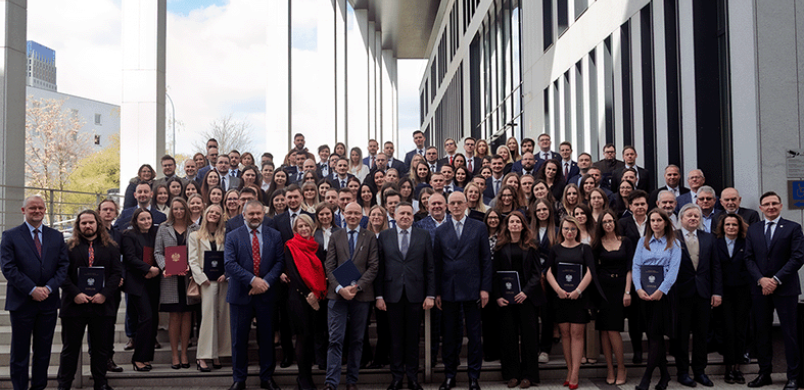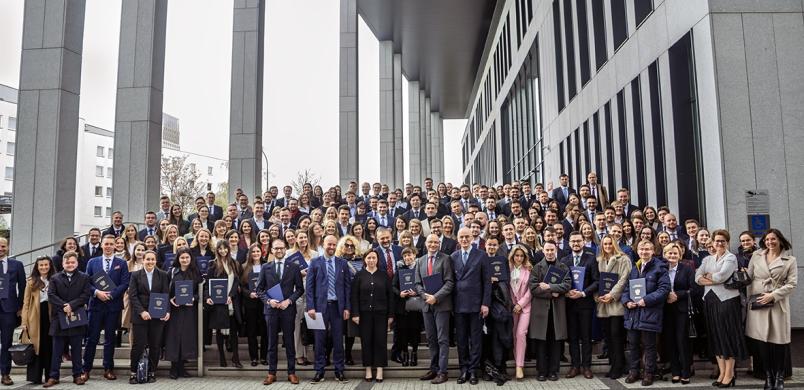Nabór na szkolenia z zakresu prawa karnego z katalogu Europejskiej Sieci Szkolenia Kadr Wymiaru Sprawiedliwości (EJTN)
Dział Współpracy Międzynarodowej KSSiP uprzejmie informuje, że prowadzi nabór na szkolenia z zakresu prawa karnego z katalogu Europejskiej Sieci Szkolenia Kadr Wymiaru Sprawiedliwości (EJTN).
Z uwagi na wciąż aktualne zagrożenie epidemiologiczne prosimy o śledzenie bieżącej korespondencji oraz komunikatów online z uwagi na możliwość odwołania, przełożenia terminu lub przekształcenia formatu szkolenia na szkolenie online. Informacje o zmianach będę publikowane oraz przesyłane zakwalifikowanym na szkolenie uczestnikom drogą mailową.
………………………………………………………………………..........................................................................................................................................................
|
Szkolenie |
Cybercrime: New Challenges in Collecting Evidence on Cyberspace in the EU (basic) – CR/2020/11 |
|
Data szkolenia: |
8-9 października 2020 roku |
|
Miejsce szkolenia: |
Scandicci, Italy |
|
Grupa docelowa: |
sędziowie, prokuratorzy, asesorzy, asystenci – z doświadczeniem zawodowym do 3 lat |
|
Forma zajęć: |
seminarium |
|
Język roboczy: |
angielski, poziom min. B2 |
|
Sygnatura: |
M9/C2/2020 |
|
Liczba miejsc |
1-2 |
|
Informacje o szkoleniu: |
|
|
Platforma Szkoleniowa |
nabór prowadzony drogą elektroniczną poprzez przesłanie formularza aplikacyjnego na adres: [email protected] |
|
Termin złożenia formularza aplikacyjnego: 8 lipca 2020 roku |
|
Opis szkolenia:
The seminar will address such issues as the international framework on cybercrime, e-evidence and privacy; digital orensics; jurisdiction problems and cross-border access to data; orders for the preservation/production of computer data and subscriber information to Service Providers; Europol’s and Eurojust’s roles in facilitating cross-border investigations involving cybercrime and/or e-evidence.
Participants will be assisted by international and national experts, Europol and Eurojust representatives. The training will include presentations on the fundamental technical and legal concepts, the role of Eurojust and Europol in judicial cooperation in criminal matters, focusing on the topics of the training’s practical cases.
Expected learning outcomes: a coherent and systematic understanding of fundamental technical and legal problems, concepts and tools, involving cybercrime and e-evidence; a better comprehension of the role’s that may be played by Eurojust and Europol in these domains.
Methodology and format
1.5 days of training based on multiple presentations and a ‘learn-by-doing’ component. Judges and prosecutors from all member States will be involved in practical workshops addressing problems of jurisdiction and international cooperation in cybercrime and the gathering of e-evidence, working on case scenarios inspired by real facts and involving both national and cross-border judicial cooperation. This training will require interaction between the participants forming the workshop groups. Participants will comment on the practical cases according to their national legal systems and, most importantly, learn about their colleagues’ systems in counterpart Member States.
**********************************
|
Szkolenie |
The European Investigation Order in Practice - CR/2020/12 |
|
|
Data szkolenia: |
20-21 października 2020 roku |
|
|
Miejsce szkolenia: |
Wilno, Litwa |
|
|
Grupa docelowa: |
sędziowie, prokuratorzy, asesorzy, asystenci – z doświadczeniem w zakresie współpracy międzynarodowej w sprawach karnych lub sprawach transgranicznych |
|
|
Forma zajęć: |
seminarium |
|
|
Język roboczy: |
angielski, poziom min. B2 |
|
|
Sygnatura: |
M9/J/2020 |
|
|
Liczba miejsc |
1-2 |
|
|
Informacje o szkoleniu: |
||
|
Platforma Szkoleniowa |
nabór prowadzony drogą elektroniczną poprzez przesłanie formularza aplikacyjnego na adres: [email protected]l |
|
|
Termin złożenia formularza aplikacyjnego: 8 lipca 2020 roku |
||
Opis szkolenia:
Aim
To provide a better understanding of the current landscape of EU cross- border gathering of evidence (Mutual Legal Assistance and Mutual Recognition) and the perspectives and challenges offered by the Directive on the European Investigation Order.
To advise on what relates those main changes with the EIO Directive in order to raise awareness among practitioners on practical questions that may arise regarding rights and obligations of the issuing and executing Member State.
How to facilitate the use of the EIO in practice when asking for some investigative measures in another Member State (examples and standard form) as well as the roles of EUROJUST and EJN.
Description
The seminar will give the opportunity to the practitioners to have an in-depth knowledge on the Directive on the European Investigation Order (EIO) and reflect on legal and practical implications in cross-border investigations: which changes with the EIO and national challenges in the implementation of the Directive.
The seminar, through key notes and study cases, also intends to provide participants with a forum of discussions to raise those questions which can help them in daily praxis on how to solve problems in cross-border investigations as issuing / executing judicial authority and highlight differences and common approaches in gathering, obtaining and use of evidence in view of its admissibility abroad. Within this context, participants will be aware of the current legal landscape of EU cross border evidence and different regimes for the obtaining of evidence based upon Mutual Legal Assistance and Mutual Recognition Principle.
Exchange best practices and experience about how differences can stop EU cross-border investigations or how practitioners could achieve a successful prosecution will be will be at the core of the seminar.
Expected learning outcomes
To provide participants with knowledge on the Directive on the European Investigation Order (EIO) and to make them to reflect on legal and practical implications in cross-border investigations: which changes with the EIO and national challenges in the implementation of the Directive
To make participants aware of the current legal landscape of EU cross border evidence and different regimes for the obtaining of evidence based upon Mutual Legal Assistance and Mutual Recognition Principle.
Methodology and format
Learning by doing approach:
- Plenary sessions, national breakout sessions, workshops in international groups, de-briefings in plenary;
- Case-scenario and group’s work
*********************************
|
Szkolenie |
Procedural safeguards in criminal proceedings in the EU in practice-CR/2020/09 |
|
Data szkolenia: |
26-27 października 2020 roku |
|
Miejsce szkolenia: |
Paryż, Francja |
|
Grupa docelowa: |
Sędziowie, prokuratorzy, asesorzy, asystenci – z doświadczeniem zawodowym we współpracy międzynarodowej w sprawach karnych i/lub unijnego prawa w zakresie procedury karnej |
|
Forma zajęć: |
seminarium |
|
Język roboczy: |
angielski, poziom min. B2 |
|
Sygnatura: |
M9/B1/2020 |
|
Liczba miejsc |
1-2 |
|
Informacje o szkoleniu: |
|
|
Platforma Szkoleniowa |
nabór prowadzony drogą elektroniczną poprzez przesłanie formularza aplikacyjnego na adres: [email protected] |
|
Termin złożenia formularza aplikacyjnego: 20 sierpnia 2020 roku |
|
Opis szkolenia:
Aim
Day-and-a-half training aimed at offering a better understanding and providing an overview of criminal defense rights under EU law through a set of Directives designed to strengthen procedural safeguards (interpretation and translation, information, access to a lawyer, presumption of innocence, children’s rights and legal aid). This training, particularly focused on the Children's Directive, will combine presentations and key notes on EU procedural rights and ECHR and CJEU case-law.
Description
Effective and enhanced cooperation in criminal matters within the European Union (EU) requires a significant degree of confidence amongst the judicial authorities in the Member States. The need to be able to trust each other’s criminal justice systems to work fairly also calls for a better understanding of other European legal systems.
Based on Article 82.2(b) of the TFEU, a strong emphasis has been focused on strengthening procedural rights for suspects and accused persons in criminal proceedings by way of EU Directives establishing a body of common minimum level of procedural rights which can be enforced by EU Law.
The training will serve as a forum for the exchange of knowledge and best practices between judges and prosecutors who will be called to resolve the challenges posed by the Directives. Through those exchanges between participants from different Member States knowledge and understanding of other EU legal systems on procedural safeguards in criminal proceedings will promote mutual trust and confidence among the EU judiciary.
Expected learning outcomes
- To provide delegates with a level of common understanding of, and support for, the objectives of the directives which are to safeguard the rights of the defense and the fairness of criminal proceedings;
- To get acquainted with a set of Directives (Roadmap Directives) which may raise many important issues of interpretation;
- To deep understanding of the EU procedural safeguards and those mechanisms to implement EU Law (direct effect, primacy of EU Law, references for a preliminary ruling);
- To reinforce aptitudes to enable participants to apply EU Law on those topics, directly or through national provisions;
Methodology and format
The structure of the seminars is aimed at requesting significant interaction among practitioners through practical workshops and plenary briefings directed by leading experts.
Learning by doing approach:
Plenary sessions, workshops in international groups, de-briefings in plenary
Case-scenario, practical exercise on a referral for a preliminary ruling; and group’s work.
**********************************
WARUNKI UCZESTNICTWA
- Znajomość języka roboczego szkolenia na poziomie min B2 (prosimy o ewentualne załączenie skanu certyfikatu do zgłoszenia).
Krajowa Szkoła zastrzega sobie prawo weryfikacji zadeklarowanego przez kandydata poziomu znajomości języka obcego w przypadku braku dokumentu potwierdzającego znajomość języka lub powzięcia przez Krajową Szkołę uzasadnionych wątpliwości w tym zakresie.
- Przesłanie we wskazanych powyżej terminach, zgłoszenia na szkolenie w postaci czytelnie wypełnionego formularza aplikacyjnego ze wskazaniem sygnatury szkolenia w temacie wiadomości na adres [email protected]
Formularz jest załącznikiem do niniejszego ogłoszenia.
Przypominamy o konieczności uzyskanie zgody przełożonego na udział w szkoleniu z wyjątkiem sytuacji określonej w art. 82 a § 5 ustawy z dnia 27 lipca 2001 Prawo o ustroju sądów powszechnych (Dz.U. z 2018 r. poz. 23 z późn. zm.), w tej sytuacji kandydat zobowiązany jest poinformować przełożonego.
KSSiP rekomenduje listę polskich kandydatów na ww. szkolenia międzynarodowe. Ostateczna decyzja o zakwalifikowaniu uczestników do udziału w seminarium zostanie podjęta przez Europejską Sieć Szkolenia Kadr Wymiaru Sprawiedliwości EJTN. Osoby zakwalifikowane na szkolenie otrzymają mailowe potwierdzenie wraz z technicznymi wskazówkami dotyczącymi udziału w szkoleniu z EJTN.
ZASADY FINANSOWANIA
Po zakończeniu szkolenia Europejska Sieć Szkolenia Kadr Wymiaru Sprawiedliwości (EJTN) zapewnia zwrot kosztów podróży w limicie do 400 EUR oraz wypłaca diety na potrzeby pokrycia poniesionych kosztów zakwaterowania i wyżywienia. Warunki refundacji oraz wykaz diet obowiązujących w poszczególnych państwach UE są dostępne w załączniku ‘Zasady finansowania szkoleń z katalogu EJTN’ poniżej. Uczestnicy zobowiązani są do zorganizowania podróży oraz rezerwacji miejsca hotelowego we własnym zakresie.
Organizatorzy nie pokrywają kosztów i nie zapewniają ubezpieczenia NNW.
Koordynator szkolenia w KSSiP:
prokurator Katarzyna Krysiak
tel. 81 440 87 37
email: [email protected]



